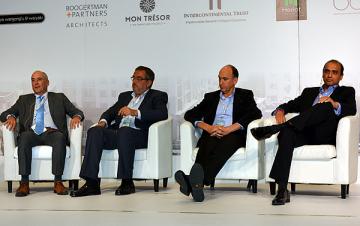Urbanisation and infrastructure development bode well for Africa's property market
 Speakers at the annual Africa Property Investment Summit in Johannesburg suggested that concerns about lower commodity prices, China’s slowdown and the currency turbulence in many of the continent’s key economies have not seriously dented long-term plans
Speakers at the annual Africa Property Investment Summit in Johannesburg suggested that concerns about lower commodity prices, China’s slowdown and the currency turbulence in many of the continent’s key economies have not seriously dented long-term plans
Africa's long-term property prospects remain bright, fueled by rapid urbanization, mass transit and transport development and a growing ageing population.
Commercial property development seems to be surging ahead in many African markets, defying the commodity price slump and currency crises.
Speakers at last week’s Africa Property Investment Summit in Johannesburg suggested that concerns about lower commodity prices, China’s slowdown and the currency turbulence in many of the continent’s key economies have not seriously dented long-term plans for large development projects in countries such as Mauritius, Mozambique, Zambia, Nigeria and others.
The property market provides a barometer for the economic fortunes of a country. The growth of shopping malls and mixed-use developments, as well as associated infrastructure such as warehousing in Africa over the past few years, shows the confidence funders, developers and tenants have in the future of many economies.
Last week, several hundred delegates from throughout Africa, Europe and the Middle East listened to the bad news about global market turbulence and the challenges of African markets. But speakers were also upbeat about new investment trends, opportunities and quality developments already under way across Africa.
Although commodities are a key driver of development in Africa, growth in the continent’s property sector is also underpinned by increasing per-capita incomes; growing formal businesses; new infrastructural links between countries, towns and cities; and the lack of housing, formal shopping facilities and decent office space in most urban areas. The building of new shopping malls, office blocks, government buildings and housing estates is defying economic problems in key markets such as Nigeria, Zambia and Ghana. In Maputo, the $150m Torres Rani residential, retail and office towers on the beachfront being built with Middle East funding are a response to the lack of A-grade facilities in this fast-growing, sprawling city.
Retail chains such as Shoprite and Massmart in SA and Nakumatt in Kenya continue to expand their footprint and new supermarket groups Choppies from Botswana and Carrefour from France are making an appearance as anchor tenants in mall developments.
But commercial developments are long-term projects that can take years to get off the ground. As a colleague often says, the best shopping mall is the one that happens, referring to projects that remain in the project pipeline for years because of a range of problems, including timing.
But developers appear to be sanguine. The rising middle class and aspirant shoppers in lower-income groups will continue to support the malls in the cities, they believe.
A rising trend is the move to smaller towns and secondary cities. These opportunities are driven largely by resources. Softening commodity prices present a risk for these long-term investments. But there are many reasons to be optimistic.
SA’s Resilient Property Income Fund has focused on building shopping malls in Nigeria’s fast-growing secondary cities, which have several million residents and no formal shopping malls. The Zambian mining towns of Solwezi and Kitwe have become urban centres for the Copper Belt, attracting custom from all over northwest Zambia and capturing business from transporters to the Democratic Republic of Congo.
This reflects a long-term urbanisation trend that is being seen across the continent as infrastructure improves and centres become more connected.
Tete in Mozambique, a town of 250,000 people, is on a transport route linking three countries. The fact that it adjoins a large coal industry is only part of the picture.
This year, the town’s first shopping mall will open. It is small with a handful of tenants. That is the model Africa needs. As one developer said, you cannot drown in shallow water.
Most Popular
Watch: A Credible Market, the need for Standards in Property Industry
Valuation standards have a significant role to play in helping to regulate professional practice at national, regional and global levels, promoting professional ethics, integrity, impartiality and trust in valuer activities in the property industry. ... Full story











